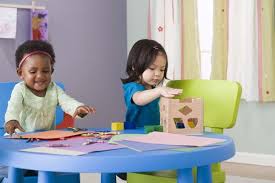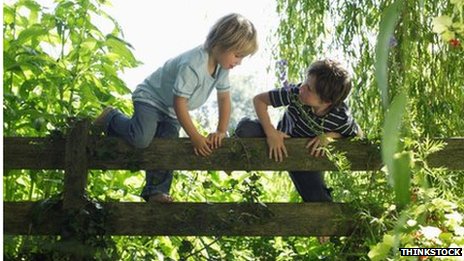The National Association for the Education of Young Children (NAEYC), the largest non-profit organization representing the early education community in the US, has a position statement for best practices in early education programs. The statement is based on extensive research in child development and the knowledge base of early childhood practitioners. Their principles are based on the fact that there are developmentally or age appropriate activities for young children that are different from what a, say, 3rd grader can do.
The first principle is that there are many selves or domains of the child. NAEYC divides these domains into social, emotional, physical and cognitive. Other theorists add creative (Hendrick & Weissman, 2011) and spiritual selves as well. An older child can somewhat separate these areas of themselves. He may sit at school doing worksheets for cognitive work, socialize with friends at lunch, be physical at recess, be creative in art, go to church on Sundays and regulate his emotions throughout. A young child cannot limit himself to performing in only one domain at a time. It is hard for him, for instance, to sit and do worksheets or manipulativesfor any length of time without talking or moving.
What parents can do at home to respect a young child’s need for integrating these domains is to create opportunities for holistic activities. This can be done while a parent and child do the laundry together. The child gets the socialization and emotional support from the quality time with the parent. The parent is supporting cognitive development by having the child sort the laundry into piles, decide which pile is bigger and measure amounts of soap. The parents are helping the child’s language growth by having conversations and by building vocabulary associated with the laundry. The child is also physically moving his hands when sorting and his whole body when lifting the laundry into the machine. Finally, the child is growing spiritually by learning how to help others get their laundry done.

As early-education teachers have learned, when young children are allowed to integrate all their domains, behavior issues drop dramatically and well-being goes up tremendously. This integration of selves or meeting the needs of the whole child should be applied everywhere for a child’s emotional and cognitive stability.
References
Copple, C., & Bredekamp, S. (Eds.). (n.d.). Developmentally Appropriate Practice
in Early Childhood Programs (Third ed.). Washington, DC: National
Association for the Education of Young Children. (Original work published
2009)
Hendrick, J., & Weissman, P. (2011). Total Learning: Developmental Curriculum
for the Young Child (Eighth ed.). Upper Saddle River, NJ: Pearson.
(Original work published 1994)



